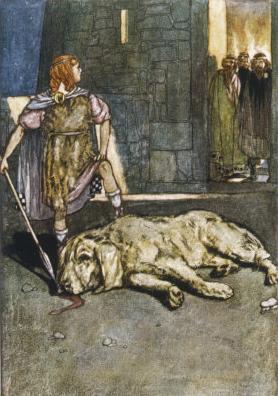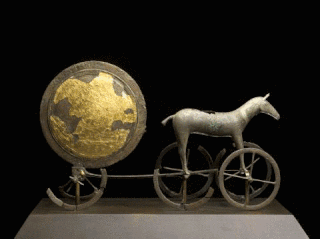Related Research Articles

A goddess is a female deity. In many known cultures, goddesses are often linked with literal or metaphorical pregnancy or imagined feminine roles associated with how women and girls are perceived or expected to behave. This includes themes of spinning, weaving, beauty, love, sexuality, motherhood, domesticity, creativity, and fertility. Many major goddesses are also associated with magic, war, strategy, hunting, farming, wisdom, fate, earth, sky, power, laws, justice, and more. Some themes, such as discord or disease, which are considered negative within their cultural contexts also are found associated with some goddesses. There are as many differently described and understood goddesses as there are male, shapeshifting, or neuter gods.

A demigod is a part-human and part-divine offspring of a deity and a human, or a human or non-human creature that is accorded divine status after death, or someone who has attained the "divine spark". An immortal demigod often has tutelary status and a religious cult following, while a mortal demigod is one who has fallen or died, but is popular as a legendary hero in various polytheistic religions. Figuratively, it is used to describe a person whose talents or abilities are so superlative that they appear to approach being divine.

Proto-Indo-European mythology is the body of myths and deities associated with the Proto-Indo-Europeans, speakers of the hypothesized Proto-Indo-European language. Although the mythological motifs are not directly attested – since Proto-Indo-European speakers lived in preliterate societies – scholars of comparative mythology have reconstructed details from inherited similarities found among Indo-European languages, based on the assumption that parts of the Proto-Indo-Europeans' original belief systems survived in the daughter traditions.
Georgian mythology refers to the mythology of pre-Christian Georgians, an indigenous Caucasian ethnic group native to Georgia and the South Caucasus. The mythology of the Kartvelian peoples is believed by many scholars to have formed part of the religions of the kingdoms of Diauehi, Colchis and Iberia.
Nature worship, also called naturism or physiolatry, is any of a variety of religious, spiritual and devotional practices that focus on the worship of the nature spirits considered to be behind the natural phenomena visible throughout nature. A nature deity can be in charge of nature, a place, a biotope, the biosphere, the cosmos, or the universe. Nature worship is often considered the primitive source of modern religious beliefs and can be found in pantheism, panentheism, deism, polytheism, animism, Taoism, totemism, Hinduism, shamanism, some theism and paganism including Wicca. Common to most forms of nature worship is a spiritual focus on the individual's connection and influence on some aspects of the natural world and reverence towards it. Due to their admiration of nature, the works of Edmund Spenser, Anthony Ashley-Cooper and Carl Linnaeus were viewed as nature worship.

Hittite mythology and Hittite religion were the religious beliefs and practices of the Hittites, who created an empire centered in what is now Turkey from c. 1600–1180 BC.

The sky often has important religious significance. Many religions, both polytheistic and monotheistic, have deities associated with the sky.

Wiccan views of divinity are generally theistic, and revolve around a Goddess and a Horned God, thereby being generally dualistic. In traditional Wicca, as expressed in the writings of Gerald Gardner and Doreen Valiente, the emphasis is on the theme of divine gender polarity, and the God and Goddess are regarded as equal and opposite divine cosmic forces. In some newer forms of Wicca, such as feminist or Dianic Wicca, the Goddess is given primacy or even exclusivity. In some forms of traditional witchcraft that share a similar duotheistic theology, the Horned God is given precedence over the Goddess.

Vietnamese folk religion is a group of spiritual beliefs and practices adhered by the Vietnamese people. About 86% of the population in Vietnam are reported irreligious, but are associated with this tradition.

A dying god, or departure of the gods, is a motif in mythology in which one or more gods die, are destroyed, or depart permanently from their place on Earth to elsewhere.
References
- ↑ Thompson, Stith (1955–1958). Motif-Index of Folk-Literature. Vol. 1–6. Indiana University Press.